|
|
|
Sort Order |
|
|
|
Items / Page
|
|
|
|
|
|
|
| Srl | Item |
| 1 |
ID:
132479
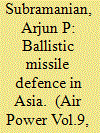

|
|
|
|
|
| Publication |
2014.
|
| Summary/Abstract |
The one continent where ballistic missiles have proliferated tremendously is Asia. There are some important factors that have been, and are, contributing to such a trend in the region. Firstly, the demand for the ballistic missile as it is a relatively cheap weapon to develop and deploy compared to a large and sophisticated air force. Also, this weapon is hard to counter even by the most technologically advanced countries. Secondly, the existing geo- political make-up where confrontation is between states that are at opposite poles of the power spectrum, where the weaker side finds such weapons most suitable to counter a technologically superior adversary. Thirdly, the ready availability of the technology and vital components through both legal and clandestine means. These factors have enabled states like North
Korea with a less than meagre technology base to adapt the technology, of course, with tremendous assistance, to develop ballistic missile capability. With the rapid proliferation of these weapons in Asia, countries facing this threat have been looking for ways to counter it. Most have turned to some level of Ballistic Missile Defence (BMD). This paper attempts to study the ballistic missile threat and the missile defence efforts of the US and its allies in East Asia, China, Israel and India.
|
|
|
|
|
|
|
|
|
|
|
|
|
|
|
|
| 2 |
ID:
132476
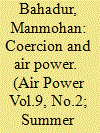

|
|
|
|
|
| Publication |
2014.
|
| Summary/Abstract |
Coercion has been the subject of many a study. To coerce an adversary's thought process and actions to one's own advantage is its end game. Paradoxically, there needs to be a con?uence of interests for discord to occur.' Coercion is not necessarily of the military kind only; in fact, a host of other measures constitute many permutations of actions that can be used to coerce an adversary's decision-making calculus. The North "Vietnamese took on the American military might in their unification effort, and movements and groups like Hamas and Hezbollah periodically fight the Israelis despite the military asymmetry that exists between the two; and the indigenous Afghans, in the long run, were not overawed, first by the might of the Soviet Union and then the Americans. In fact, one study suggests that the initiation of approximately 30 percent of conflicts has been done by the weaker party? Why does this happen and where does air power fit in the equation?
|
|
|
|
|
|
|
|
|
|
|
|
|
|
|
|
| 3 |
ID:
132478
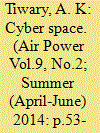

|
|
|
|
|
| Publication |
2014.
|
| Summary/Abstract |
Nothing remains, neither the state nor wealth nor valour without the security provided by the armed forces. -- S H Ukraniti
Cyber space and the possibility of Cyber war, as it emerged in the late 1980s got mixed up with Information War (IW)/ Electronic War (EW). This led to numerous definitions of lW/EW/cyber war, and most definitions, instead of clarifying the issue, only created further confusion. For the purpose of this paper, the latest definition of cyber space, promulgated in the USA in 2010 being the most comprehensive, has been adopted. It defines cyber space as, "A global domain within the information environment consisting of the inter-dependent network of information technology infrastructure and resident data, including the Internet, tele-communication networks, computer systems and embedded processors and controllers." This indicates that there is a physical domain of hardware, and an information domain of software. How we deal with the information or data resident in this domain to deceive the enemy/cyber criminal becomes part of the third domain-
|
|
|
|
|
|
|
|
|
|
|
|
|
|
|
|
| 4 |
ID:
132482


|
|
|
|
|
| Publication |
2014.
|
| Summary/Abstract |
It is ironical that relations between China and Japan, despite their sharing a history of two millennia as neighbours, are ranked as the number one hostile bilateral relationship in the G-20'. Events since the end of 19th century have created a long baggage of historical memories that strongly define their relations in the present day. However, the strong economic integration between the two countries has resulted in the third largest bilateral trade relationship in the world, amounting to $334 billion2 (2012 figures) just behind the US-Canada and US-China bilateral relationship at $645 billion3 and $536 billion' respectively. China surpassing Japan in 2010
|
|
|
|
|
|
|
|
|
|
|
|
|
|
|
|
| 5 |
ID:
132483
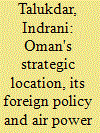

|
|
|
|
|
| Publication |
2014.
|
| Summary/Abstract |
Oman has emerged as a powerful small country in the international relations arena. With an independent and pragmatic foreign policy, Oman is maintaining a balanced relationship with all its neighbours, including Iran. In times of crisis, its policy will be an asset to the West, especially the US. It is against this backdrop that this article traces the strategic position of Oman, its foreign policy and its relationship with the US. It also focusses on Oman's defence forces, especially its air power. In doing so , the article analyses how India's position will be important for both Oman and the US. and vice Versa.
|
|
|
|
|
|
|
|
|
|
|
|
|
|
|
|
| 6 |
ID:
132481
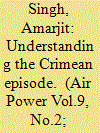

|
|
|
|
|
| Publication |
2014.
|
| Summary/Abstract |
Before anyone comments on Russia's actions in Crimea one way or the other, Russia's history must be understood, and it must be realised that Russia's reasons for expansionism in the 19th century and afterwards go back 800 years, to the day that Chengiz Khan's hordes invaded Rus in what was a full-scale campaign from 1237-40. Having crossed the Volga River in 1236 and taking a year to defeat the Volga Bulgarians,Batu Khan demanded the surrender of Yuri III of Vladmir. Receiving none, Batu Khan completely annihilated the city of Ryazan, squarely defeating Yuri's sons in an ensuing battle, and followed this up by burning Kolomna and Moscow. Within days, he burned the capital of Vladimir, where Yuri III and the royal family perished in the fire.'
|
|
|
|
|
|
|
|
|
|
|
|
|
|
|
|
| 7 |
ID:
132480
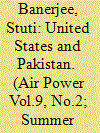

|
|
|
|
|
| Publication |
2014.
|
| Summary/Abstract |
Political instability, economic Volatility, the rise of the right-wing political leadership and an increase in the number of terrorist organisations operating from Pakistan and gaining the support of the Pakistani establishment have nations concerned about the safety of the nuclear assets within Pakistan. Adding to the problem is the well documented proliferation network that has supplied nuclear technology to North Korea, Libya and Iran, with Pakistan, at its centre. These actions have increased the problems and challenges that nuclear proliferation poses. The proliferation of nuclear weapons technology, associated technology and/ or nuclear material to any state or non-state actor, not recognised to receive such technology or material, is one of the most serious dangers to the international security environment. This contributes to not just regional instability and global proliferation, but also increases the risk of violent non-state groups obtaining a nuclear weapon, with a number of violent extremist groups opposed to
India operating from Pakistan. These issues have raised concerns among the international community about the security of Pakistani nuclear weapons. For the United States, Pakistan poses a serious dilemma. Pakistan has been an 'ally' of the United States during the Cold War and continues.
|
|
|
|
|
|
|
|
|
|
|
|
|
|
|
|
| 8 |
ID:
132477
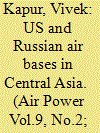

|
|
|
|
|
| Publication |
2014.
|
| Summary/Abstract |
The Central Asian region comprises the former Soviet Socialist Republics that are, since 1991, the newly independent states of Kazakhstan, Kyrgyzstan, Tajikistan, Uzbekistan and Turkmenistan, and lie between the Caspian Sea and western China. This region occupies a central position in world geography. The region lay at the heart of the great Asian empires of the Mongols, Omayyads, Abbasids, Samanids, and Saljuquid Turks and was the base of Timur the Lame or Tamerlane who forayed into northern India
also. Babur emerged from this region to invade India and establish the Moghul Empire.' Geo-politically the power that is able to control Central Asia is in a position to access all other parts of Asia as well as Eastern Europe and the Middle East with relative ease; this makes this area a hotbed of competition among the major global powers.
|
|
|
|
|
|
|
|
|
|
|
|
|
|
|
|
|
|
|
|
|